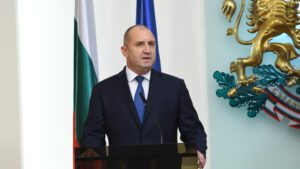
Bulgaria symbolically criticized and declared itself against Russia by stopping the lights on the monuments of the Soviet Union in the five largest cities of the country on the same day when Russian president Vladimir Putin declared military mobilization and threatened NATO members with nuclear weapons.
On September 21, at 20:00, the Metropolitan Municipality turned off the floodlights of MOCHA (the Soviet monument in the heart of Sofia). Thus, Sofia’s Independence Day celebration began with the stirring theme “Darkness for Light.” This first symbolic move is crucial in the struggle against the corrosive Russian influence in Bulgaria and the fratricidal war in Ukraine. Plovdiv also joined the campaign where the Ayosha monument in Plovdiv fell into the darkness. The mayors of Stara Zagora, Burgas, and Varna declined to comply.
The floodlights on the monument of the Soviet army were also shut down in the evening. It was unveiled in 1954 and was given the name “Monument of the Soviet Army” by Joseph Stalin in 1946. It was produced by Soviet court painters in Bulgaria, including Ivan Funev, Lyubomir Dalchev, and Vaska Emanuilova.
After the Berlin wall’s fall, Sofia’s residents tried to remove this aggressive sculptural configuration, including the historical misinformation about the Red Army as a liberator, but could not succeed. The reality is quite the opposite. Stalin and his Red army entered to capture and install a sinister Soviet-style communist regime in Bulgaria. The actions of Stalin caused more than ten thousand deaths in Bulgaria, and countless people mourned.
Apart from this, Bulgaria celebrated its 114’th independence day. The national holiday on this day was declared in 1990. President Roumen Radev congratulated Bulgarian citizens and commented that we’re proud of being Bulgarian. He posted a Facebook post and wrote, ” Our ancestors rejected the idea that Bulgaria might be subservient to anyone 114 years ago. This is our culture, public life, and national growth that will continue to inspire our upcoming generations”.

